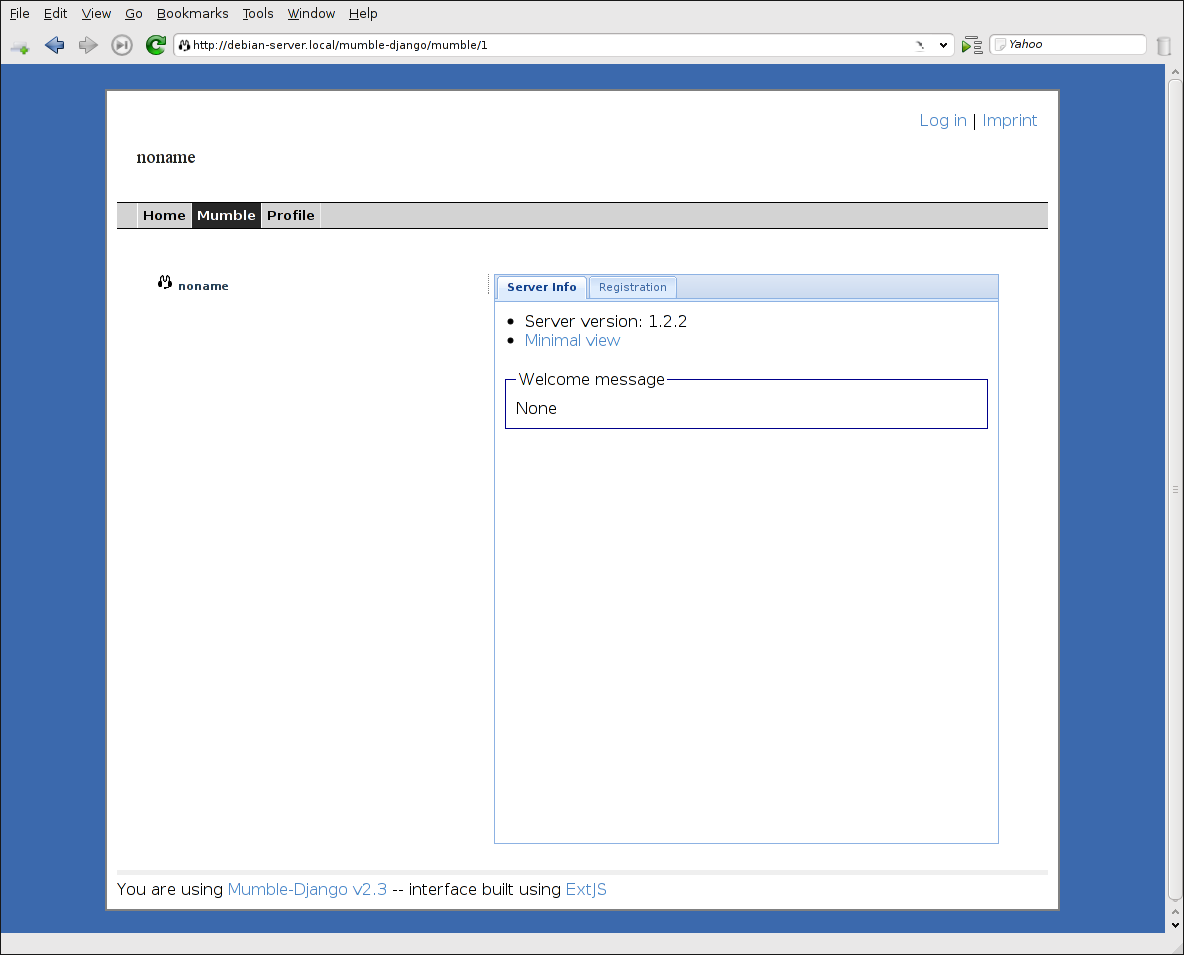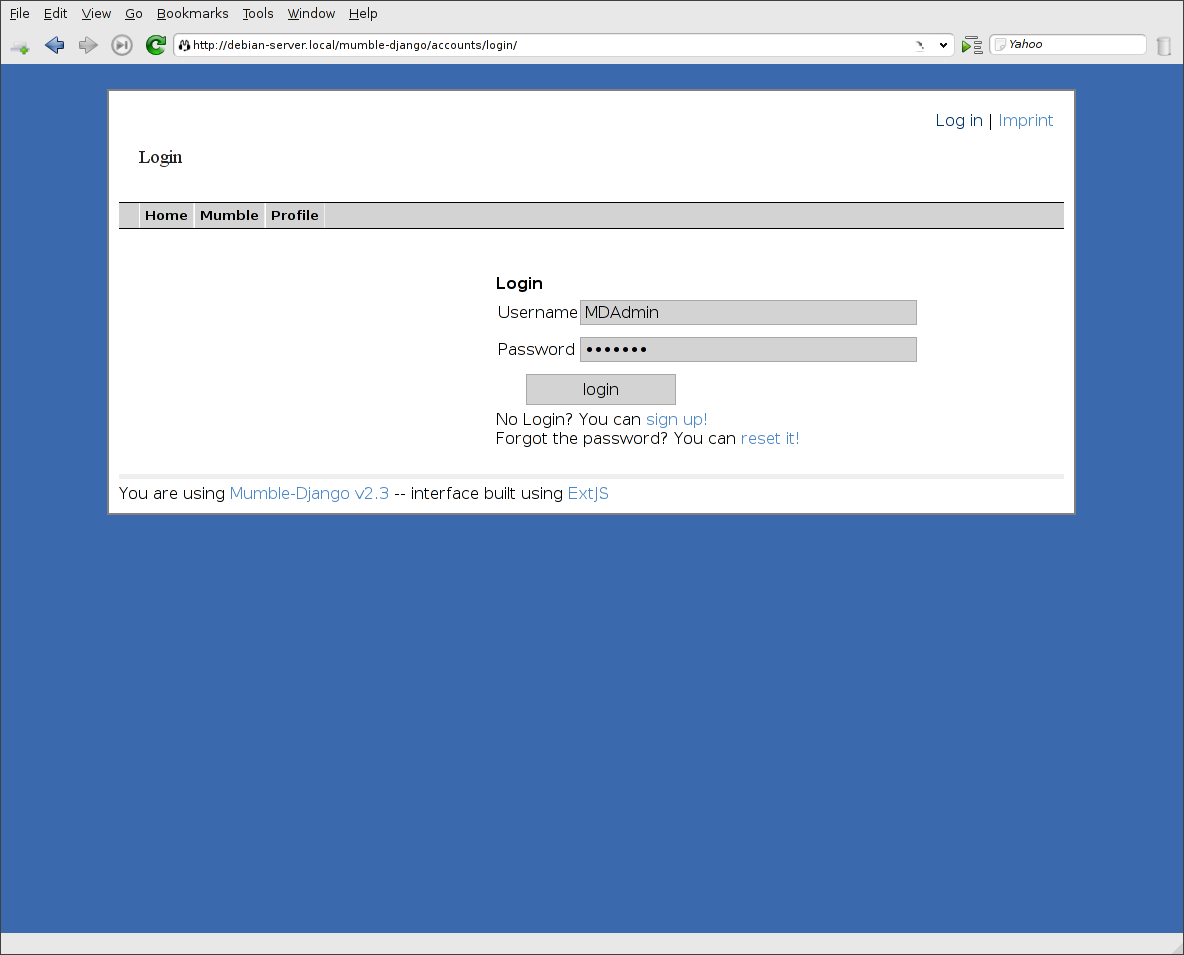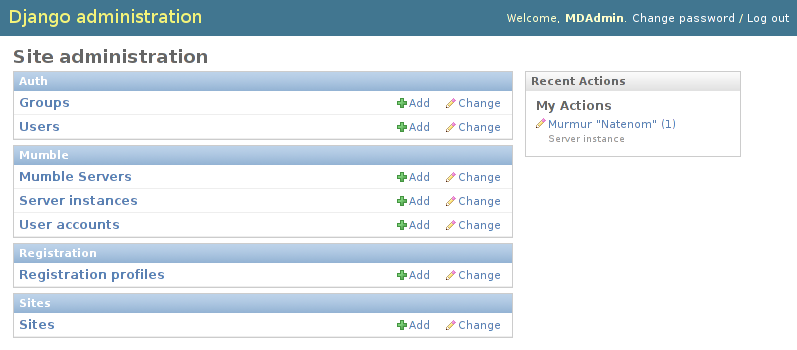Inhaltsverzeichnis
Mumble-Django Installation auf Debian – mit Debian-Paketen (veraltete Version)
Tipp: Eine Anleitung für die Installation des aktuellen Mumble-Django 2.10+ auf Debian Wheezy (7) gibt es hier.
Installation von Mumble-Django auf Debian-Squeeze.
Auf einem Debian-Squeeze läuft auch die aktuelle Entwicklerversion, mit der mittlerweile alle Servereinstellungen zugänglich sind, auch die für Mumble 1.2.4, siehe im Blog.
Herunterladen: https://bitbucket.org/Svedrin/mumble-django/get/tip.zip.
Anleitung dazu: http://docs.mumble-django.org/en/installation.html.
Ausgangssituation
Wir gehen von einem Debian Squeeze Server aus auf dem bereits ein Mumble-Server (Murmur) installiert ist.
Sollte keiner installiert sein, können wir dies nachholen mit:
apt-get install mumble-server
Weitere Informationen zur Installation eines Mumble-Servers (Murmur) finden sich hier: Mumble-Server (Murmur) installieren.
Je nach Version des Mumble-Servers ist die Einstellung „icesecretwrite“ auf einen leeren Wert eingestellt, wie z. B.:
icesecretwrite=
Dies führt dazu, dass Mumble-Django sich nicht verbinden kann. Benötigt man keine Sicherung der Ice-Verbindung, so muss man in der .ini-Konfigurationsdatei (z. B. murmur.ini) die genannte Einstellung auskommentieren, indem man eine Raute (#) davor setzt.
Soll die Verbindung zwischen Ice und dem Mumble-Server gesichert sein, so muss man dasselbe Passwort sowohl in der .ini-Konfigurationsdatei (z. B. murmur.ini) als auch in Mumble-Django hinterlegen.
Mumble-Django installieren
apt-get install mumble-django
Verwendet man einen Mumble-Server ab Version 1.3.0, so muss man Mumble-Django geringfügig anpassen, siehe hier, bevor man zum nächsten Schritt gehen kann.
Gefolgt von
mumble-django-configure
Es erscheint nun folgende Auswahl:
Welcome to mumble-django-configure!
-------------------------------------------
What do you want to do?
> 1) Detect a new Mumble-Server instance and make it known to Mumble-Django
2) Create a new SuperUser for Mumble-Django's web admin interface
Note: This will be done automatically when you run 1) for the first time.
3) Drop to a Python shell.
4) Drop to a Database shell.
Mumble-Server detection ----------------------- If this is the first time you run this script, you might want to probe for the Debian default configuration instead of entering the service string yourself. Please choose what service string to use. > 1) Debian default 2) user defined
Running as www-data: manage.py syncdb /usr/lib/pymodules/python2.6/registration/models.py:4: DeprecationWarning: the sha module is deprecated; use the hashlib module instead import sha Creating table auth_permission Creating table auth_group_permissions Creating table auth_group Creating table auth_user_user_permissions Creating table auth_user_groups Creating table auth_user Creating table auth_message Creating table django_admin_log Creating table django_content_type Creating table django_session Creating table django_site Creating table registration_registrationprofile Creating table mumble_mumbleserver Creating table mumble_mumble Creating table mumble_mumbleuser You just installed Django's auth system, which means you don't have any superusers defined. Would you like to create one now? (yes/no): Username (Leave blank to use 'www-data'): MDAdmin E-mail address: mdadmin@natenom.com Password: Password (again): Superuser created successfully. Please enter the Ice secret (if any): Found new Murmur instance 1 on bus 'Meta:tcp -h 127.0.0.1 -p 6502'... Installing index for auth.Permission model Installing index for auth.Group_permissions model Installing index for auth.User_user_permissions model Installing index for auth.User_groups model Installing index for auth.Message model Installing index for admin.LogEntry model Installing index for mumble.Mumble model Installing index for mumble.MumbleUser model No fixtures found. Apache2 ----------------------- If you have changed any settings in settings.py, you should reload the Web server in order for the changes to take effect. Do you want to reload Apache2 now? 1) Yes, reload Apache2. > 2) No, don't do anything.
Munin ----------------------- You do not appear to have Munin-Node installed, skipping. Running a few checks... Running as www-data: manage.py checkenv /usr/lib/pymodules/python2.6/registration/models.py:4: DeprecationWarning: the sha module is deprecated; use the hashlib module instead import sha Checking slice file... [ OK ] Checking root directory access... [ OK ] Checking database access... [ OK ] Checking URL configuration... still the default. The domain is configured as example.com, which is the default but does not make sense. Please enter the domain where Mumble-Django is reachable. > vm-debian-server.local vm-debian-server.local [ OK ] Checking Murmur instances... [ OK ] Checking if an Admin user exists... [ OK ] Checking SECRET_KEY... [ OK ] Goodbye.
Fertig :)
Entgegen der README in Debian ist Mumble-Django nicht über http://localhost:8002 erreichbar sondern über http://domain.tld/mumble-django oder über die IP http://IP_DEINES_SERVERS/mumble-django
Erhält man einen Fehler wie z. B.:
python /usr/share/mumble-django/pyweb/manage.py createsuperuser
Traceback (most recent call last):
File "/usr/share/mumble-django/pyweb/manage.py", line 27, in <module>
execute_manager(settings)
File "/usr/lib/python2.7/dist-packages/django/core/management/__init__.py", line 459, in execute_manager
utility.execute()
File "/usr/lib/python2.7/dist-packages/django/core/management/__init__.py", line 382, in execute
self.fetch_command(subcommand).run_from_argv(self.argv)
File "/usr/lib/python2.7/dist-packages/django/core/management/base.py", line 196, in run_from_argv
self.execute(*args, **options.__dict__)
File "/usr/lib/python2.7/dist-packages/django/core/management/base.py", line 232, in execute
output = self.handle(*args, **options)
File "/usr/lib/python2.7/dist-packages/django/contrib/auth/management/commands/createsuperuser.py", line 70, in handle
default_username = get_default_username()
File "/usr/lib/python2.7/dist-packages/django/contrib/auth/management/__init__.py", line 105, in get_default_username
default_username = get_system_username()
File "/usr/lib/python2.7/dist-packages/django/contrib/auth/management/__init__.py", line 85, in get_system_username
return getpass.getuser().decode(locale.getdefaultlocale()[1])
TypeError: decode() argument 1 must be string, not None
Dann muss man in der Datei /etc/locale.gen eine locale aktivieren, gefolgt von einem
locale-gen
Dann schreibt man in die Kommandozeile den folgenden Befehle:
export LANG="locale" # z. B. LANG="en_US.UTF-8"
Dann ruft man mumble-django-configure erneut auf.


